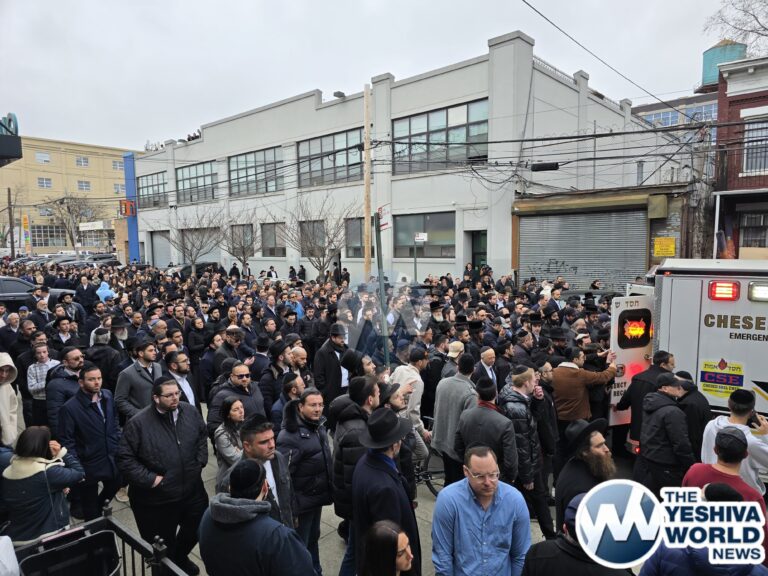 A number of weeks ago, HaRav Eliyahu Schlesinger Shlita, the chief rabbi of Jerusalem’s Gilo neighborhood and the posek for the Jerusalem Rabbanut Kashrus Division took a major step and successfully removed Keter Kashrut signs from many many stores in the downtown capital area. It was a first and major step towards removing the many unauthorized and downright bogus kashrus certificates that plague the capital.
A number of weeks ago, HaRav Eliyahu Schlesinger Shlita, the chief rabbi of Jerusalem’s Gilo neighborhood and the posek for the Jerusalem Rabbanut Kashrus Division took a major step and successfully removed Keter Kashrut signs from many many stores in the downtown capital area. It was a first and major step towards removing the many unauthorized and downright bogus kashrus certificates that plague the capital.
Due to the work of kashrus inspectors of the Rabbinate Fraud Division, headed by Rafi Yochai, and the assistance of others including affidavits and testimony, the Chief Rabbinate is building its case in response to a Supreme Court case.
The head of the Keter Kashrut, Sami Mizrachi, has challenged Rabbi Schlesinger’s decision in the nation’s highest court, insisting he has a right to sell his supervision to stores.
It should be pointed out that many stores have supervision from the Jerusalem Rabbinate, regular and not mehadrin, and then take one of the inexpensive bogus supervisions which make claims of providing mehadrin service when in actuality; there is no mashgiach, no supervision and no mehadrin.
Much of this has been documented in the Google Jerusalem Kosher News group headed by me, having spent over a year documenting the false claims of Keter Kashrut, Nachlat Yitzchak, Nezer HaHidur, and many more of these agencies established as a source of income, not dealing with true kashrus concerns.
Actually, today, Thursday, I gave my testimony to Rafi, working to assist the Fraud Division in preparing its response to the High Court of Justice.
I must take this opportunity to warn readers that many of the “mehadrin” signs posted in the capital are bogus and in no way provide a standard that mehadrin consumers from North America are accustomed to. Such fake certificates are seen in the downtown area, the Jerusalem Central Bus Station, Malcha Mall and many other areas and cities around Israel. Tel Aviv, especially the central bus station, is also plagues with fake hechsherim, as are other cities in Israel.
For additional information or to join the Jerusalem Kosher News list, click HERE.
(Yechiel Spira – YWN Israel)











5 Responses
And what keeps the government for using the same legal principles to ban kashrus certificates on the grounds the agency doesn’t obey government policy on shmittah, or refuses to hire gay and female shochtim. Once the government is involved, no heksher is worth anything, which is why even in Israel many frum people look for certificates issued by someone they trust.
The US system is better. Kashrus is never a function of the government. Private groups have well known symbols protected by trademark. In court, the issue isn’t “what is kosher”, but rather, “is this an authorized use of a trademarked symbol” which leaves halachic question to our rabbanim, not to the secular judges.
The Rabbanut has an edge on private agencies as it can pressure other government agencies to have Kosher Cafeterias, without the Rabbanut I doubt if the cafeteria in teh Knesset or Ministry of Housing would have kosher cafeterias or Hebrew University.
The Rabbanut does not have the power to ban legitimate kashrut agencies such as Belz and Eidah Hachareidit but it does have the power to prevent fraudulent agencies from operarting. Thes bogus agencies do not provide mashgichim as are nneded nor is their standard anywhere close to what people expect from Mehadrin.
The other advantage of Rabbanut is that they do take into consideration both Ashkenazi and Sfaradi standards so that all can eat in their establishments. No one forces an establishment to have a Rabbanut hashgocha.
In America there are many fake hashgochos including those who claim to be Orthodox yet employ mashgichim who are rabbis in conservative temples, whose wives do not cover their hair or keep taharas hamishpacha, claiming that they have to rely on them because there are no orthodox rabbis in that area.
There is no reliable agency that relies on non-shomer torah umitzvos mashgichim. The store of “but there is no one Orthodox in that area” is a false story sold by the “Heimeshe” hashgochos against the national agencies. In fact, there are no “Heimishe” mashgichim in many areas, and the heimishe hashgochos rely on the local Orthodox Rabbi.
NY100k, part of your comment is based on a lack of understanding of the “Heimishe Brand Industry”. Most, if not all, products marketed under Heimishe brands that don’t have their own plant are produced as a run at a private label company similar to store brands. The Rav Hamachshir or his representative will trvel to the plant for that day or days. Accordingly, there is no need for reliance upon anyone local.
The “rabbinate” (government sponsored rabbinical authority) says the the 5th of Iyar is a yuntuf, and you should say Hallel.
The bottom line, is that the Israeli government, which is overwhelmingly secular, picks the rabbinate, all of whom are civil servants.
It is absurd to rely on the Israeli government for anything in the area of kashruth, ever. Private groups aren’t subject to radical change in management based on elections dominated by other than frum Jews. Better to rely on our rabbanim and halachas, and not the government, any government, but especially the Israeli one.